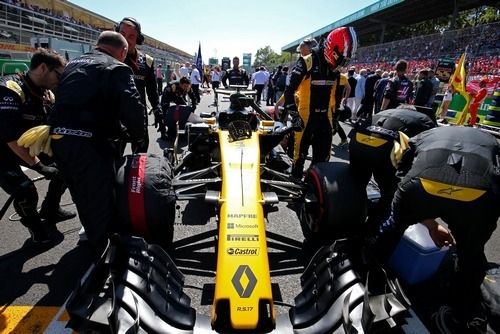
To say that the Italian Grand Prix starting grid was confusing would be a massive understatement. It wasn’t just that the rain during qualifying had massively shuffled the grid, but also the sheer amount of grid penalties that were handed to drivers. Fans and analysts have ridiculed the current grid penalty system. So, what needs to be done to the grid penalty system.
There were a staggering nine drivers who had received grid penalties before Sunday morning, equaling a combined total of 150 grid positions. That’s very nearly half of the drivers on the grid. All of these penalties were either for an unscheduled gearbox change or going over the limit for power unit elements. Isn’t that insane?
No. Although a lot of fans think that the FIA are crazy to impose all of those penalties, they were all legitimate penalties, none of which were even the tiny bit borderline. That’s the beauty of grid penalties of this nature. It’s not like it’s a judgement thing that can be disputed. It’s either “yes, you did it” or “no, you didn’t”. I get that adding that many penalties can be chaotic and confusing, but revising the penalty system isn’t necessary. We need to remember why the grid penalties for gearbox changes and power unit consumption are there.

It’s very much a budget thing. If we don’t limit the number of components that teams can use per season and punish teams that do over the limit, teams that have massive budgets would be able to use more power unit components per season and get a performance advantage. The remaining teams would have to dish out more money (more than many of the teams can afford to spend) just to have a hope of staying somewhat competitive.
I think that, at times, the grid penalty system isn’t strict enough. If you take a situation like Mercedes last year, where they stacked grid penalties into a single round to avoid future penalties, there are number of loopholes to escape any real disaster.
It’s, quite frankly, stupid that the sport and fans of the sport are calling for a budget cap to keep things fair in Formula One, while at the same time attacking the only system that the sport currently has to control costs. The two are counteracting each other.
And you know what: there’s no real downside to these grid penalties from a fans perspective. One of the highlights and talking points after the race was Daniel Ricciardo’s stunning performance to recover from his penalty. This isn’t something that would have happened otherwise and it probably would have meant that the Italian Grand Prix would have been really boring to watch.
And I’m not saying that the current grid penalty system is perfect. I’m not saying that it’s ok for a team like McLaren to infinitely be stuck at the back of the grid because their engine supplier is incapable of producing a decent power unit. I’m not saying that it’s ok for a championship contending driver to miss out on the chance to earn valuable points because they had an unexpected engine failure during the weekend. But, that being said, I really don’t see an alternative.
Nevertheless, Ross Brawn, someone who was already not a fan of the system, has vowed to talk with the FIA about changing the grid penalty regulations. The idea of financial penalties has been thrown around, but that’s the complete opposite of limiting the cost of the sport.
It’s unclear what, if anything, will be changed about the current penalty system. It’s also unclear when any changes would be implemented into the sport. I’m hoping that there will be no changes, but we’ll very much have to wait and see how things pan out.
The views and opinions expressed in this article are solely those of the author and do not necessarily reflect the official policy or position of any other agency, organization, employer or company. Assumptions made in any analysis contained within this article are not reflective of the position of any entity other than the author.